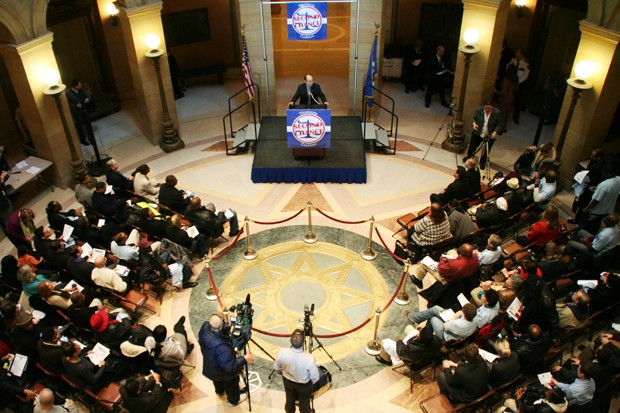Hundreds of ex-offenders and justice reform supporters gathered at the State Capitol on Monday for Second Chance Day on the Hill, an event to raise awareness of the barriers ex-offenders face and to encourage lawmakers to support legislation to reduce these barriers. The Minnesota Second Chance Coalition, comprised of about 40 organizations that work to raise awareness of the obstacles that confront ex-offenders, hosted the event. Sarah Walker is the chief operating officer of 180 Degrees Inc., an organization that helps ex-offenders reintegrate into the community. Walker said barriers that make it difficult for ex-offenders to obtain things such as employment and housing increase the burden on the criminal justice system because these barriers make ex-offenders more likely to offend again. Several justice reform supporters, public officials and ex-offenders spoke at the event. Richard Gardell, president and CEO of 180 Degrees Inc., said that giving ex-offenders more opportunities to succeed as productive citizens makes the community safer. âÄúIt enhances the quality of life for every Minnesotan,âÄù Gardell said. St. Paul police Cmdr. Todd Axtell said that assisting ex-offenders upon re-entry into the community benefits everyone, and that the police department helps officers grasp this concept. âÄúThe St. Paul Police Department believes in second chances,âÄù Axtell said. Many ex-offenders held up signs displaying messages such as âÄúJob$ not Jail,âÄù and âÄúGive us meaning, not demeaning.âÄù Pamela Rogers, an employment specialist for Project for Pride in Living, an organization that works with low-income individuals and families to obtain housing, employment training and education, said she knows firsthand the importance of second chances. Rogers said that four and a half years ago she was homeless, struggling with a 14-year crack cocaine addiction and had 74 criminal cases to her name. While trying to turn her life around, Rogers said she faced many obstacles in finding a job and a place to live. Now employed, housed and two classes away from earning her degree, Rogers said she is grateful to have been given a second chance. âÄúIâÄôm here today to show you that there are people out there that are worth it,âÄù Rogers said. Other speakers addressed their concerns with barriers faced by specific groups of ex-offenders, such as veterans and former juvenile offenders. Brockton Hunter, legislative chair of the Minnesota Association of Criminal Defense Lawyers, said Iraq war veterans face many difficulties when returning home, such as dealing with major psychological injuries. Hunter said these veterans, who may sometimes turn to crime upon returning home, benefit more from treatment and probation than incarceration. Other ex-offenders are confronted with obstacles stemming from their juvenile record, said Judge Pamela Alexander, president of the Council on Crime and Justice. Alexander said the council is working to pass the 2010 Juvenile Records Reform Act, which would further limit access to juvenile records. Sen. Mee Moua, DFL-St. Paul, said she supports legislation that would reduce barriers for ex-offenders, but she added that the proposed bills are not about âÄúletting people get away with things.âÄù Moua said once ex-offenders have served their time and paid their dues to society, they should be given an opportunity to pick up their lives.

Image by Joe Michaud-Scorza
St. Paul attorney and chief prosecutor John Choi speaks to several ex-offenders, their families, and supporters at “Second Chance Day on the Hill,” on Monday at the State Capitol. Among other restorative justice programs represented, the Second Chance Coalition seeks to help ex-offenders become productive members of their community.
Justice reformers gather at Capitol
Past criminal offenders face obstacles as they reintegrate into the community.
Published February 22, 2010
0
More to Discover







